#Queen Viarra
Explore tagged Tumblr posts
Text
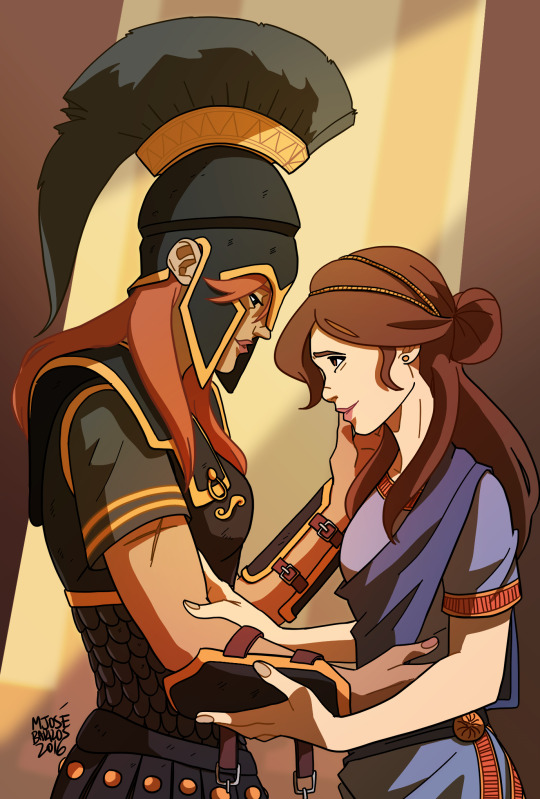
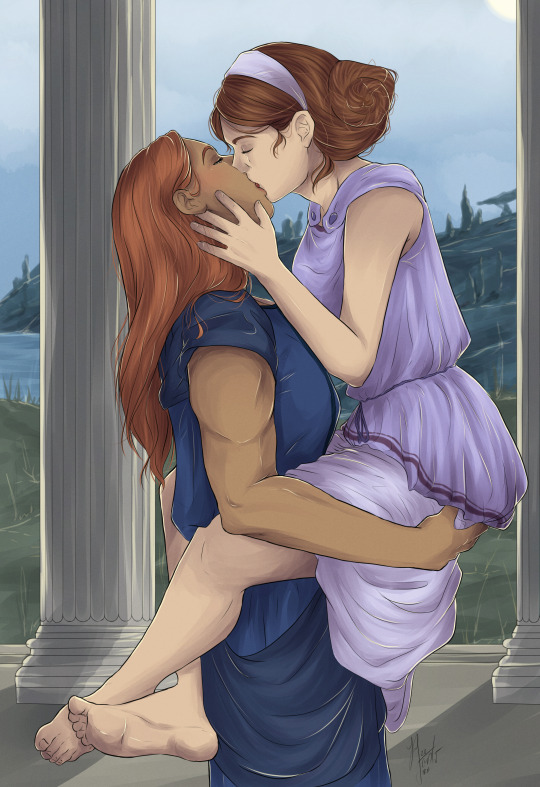
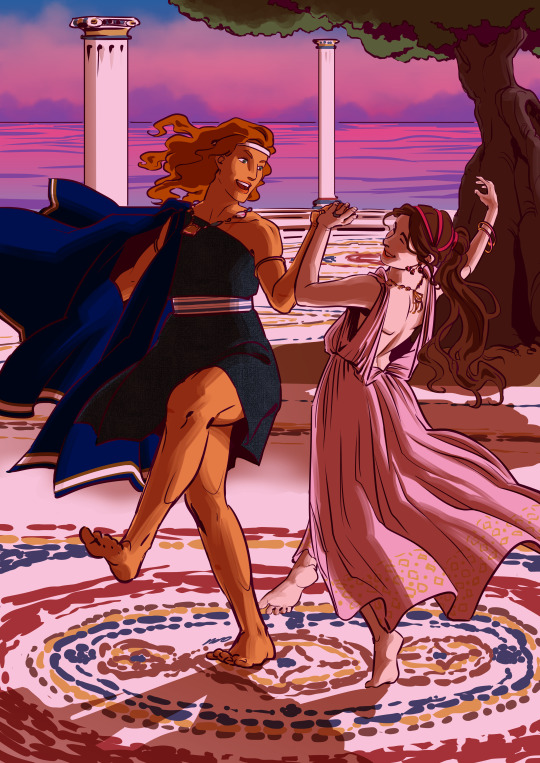
For lesbian awareness week here's art of my warrior-queen Viarra and her handmaid Elissa from my novel-in-progress, The First Empress! All of them commissions from the amazing artists MJ Barros, Chenria (@chenria), and Telenia Albuquerque (@9musesandanoldmind). Elissa has been Viarra's servant and companion since they were little, they become lovers for the first time as teens, and after she becomes queen Viarra makes Elissa her royal concubine.
#MJ Barros#Chenria#Telenia Albuquerque#First Empress#Queen Viarra#Handmaid Elissa#wlw#lesbian visibility week#character art
131 notes
·
View notes
Text
In the name of fairness, King Cheridan, I’ll offer you three choices to resolve this situation. Firstly, you can abdicate your throne and assist my soldiers in a clean transferal of control over to a designated satrap. You’ll lose all political power and leave into exile afterward, but your people will remain under my hegemonic protection. Your second option, you can leave here peacefully and return to your island as ruler, but I will withdraw my protection, trade agreements, and noninterference treaties. While I’m certain your fleet and hoplites are adequate for defending against pirate raids, you may want to ask yourself if they can defend your waters from privateers sent by other poleis who I’m no longer obligated to protect you from. Or lastly, you can draw your sword against me in anger and give me an excuse to kill you where you stand. I, personally, prefer the third option, but I think it’s only fair to let you decide.
---Queen Viarraluca, The First Empress: Book II
12 notes
·
View notes
Photo

I am so happy with how this turned out actually. @heroineimages commissioned me again to draw their lovely Viarra and Elissa - and I love fluffy romance pictures, so I was really happy to work on this picture.
Viarra, tough and fierce warrior queen, with her lover Elissa ♥
82 notes
·
View notes
Text

Ah! I also meant to post this terrific new commission from the always amazing @mjbarrosart! My girl Queen Viarra looking all impressive in her blackened-bronze armor---the same design that MJ came up with for the previous commissions of my girl:


In fact, I liked the design well enough that I used it in the novel! Hugest thanks to MJ once again for how it turned out!
13 notes
·
View notes
Text
Copper hair

So I've struggled for a long time trying to figure out a color on Hero Forge that fits what I imagine when I describe Queen Viarra's hair as looking like 'polished copper.' I finally just took the default copper color and played with the low, high, and mid shades until I found something I liked. I think it turned out fairly striking, honestly.
Link: https://www.heroforge.com/load_config%3D11600475/

Link: https://www.heroforge.com/load_config%3D32240824/

Link: https://www.heroforge.com/load_config%3D26748694/
8 notes
·
View notes
Text
I've already prepared the response, "Queen Viarra's pagan. She's never read the Bible," for any readers who criticize her morality in Christian terms.
“that character is a war criminal” that character is from a fictional fantasy world and did not attend the geneva convention
90K notes
·
View notes
Text
Since trucks obviously aren't invented yet in my Iron Age story, it took a while to decide on a good hyperbole for how hard Queen Viarra punches. I finally decided on 'hits like a quarry sledge,' though 'like a trireme ram' was also tempting.
35 notes
·
View notes
Text
Introduction to The First Empress

(Art by @mjbarrosart)
The king is dead and so are his brothers. On a night of blood and death, Princess Viarraluca finds herself the sole surviving heir of the floundering island city-state of Kel Fimmaril. In training to be her island’s next polemarch, or high-general, Viarra instead takes up her brother’s throne as her people’s warrior-queen and protector.
However, a conversation with a surrendering enemy officer presents Queen Viarra with the opportunity to become much more than just the petty queen of a small island city. Will she save not only her own people but the people of a large but struggling hegemony in desperate need of strong leadership? Or will her maneuvering and machinations draw the attention and ire of powerful political rivals, unhappy with the presence of a new player in their dangerous game of geopolitics?
The First Empress: Book I is a 114,000-word novel inspired by my studies of Classical Greek history. The story is an adult Iron-Age period-fantasy that explores ancient-world politics, culture, warfare, and sexuality, including a mostly bisexual primary culture and a lesbian leading couple. The story and characters are inspired by the many books I've read about ancient history and figures like Queen Zenobia of Palmyra, King Philip II of Macedon, and his son Alexander the Great, among many others.
Important links:
My official blog on Wordpress
About Page
A handy glossary of some of the Classical Greek vocabulary
The Tollesian pantheon
The Tollesian calandar
Maps!
42 notes
·
View notes
Text
Warrior Princess in Exile
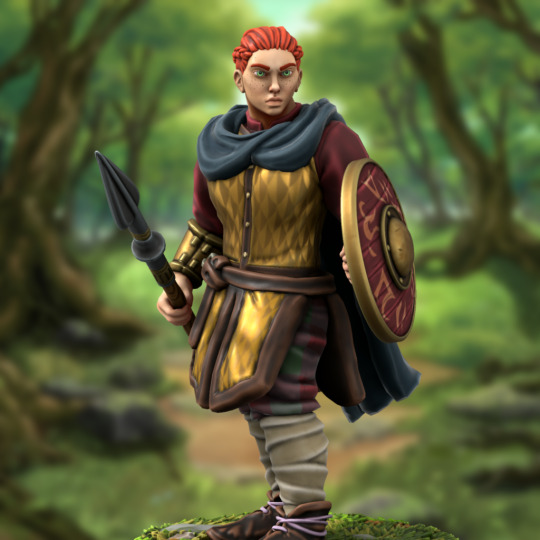
Link: https://www.heroforge.com/load_config%3D46566089/
As mentioned a while back, I'm planning a spin-off of sorts to The First Empress, starring Viarra's mom, the Warrior-Princess Lutaxa of the Andegamni tribe. Lutaxa's people are based on the ancient Celtic tribes, and in particular the Pre-Roman Gauls. My working title for the story is Warrior Princess in Exile, though I'm open to other names. I finished the first full scene earlier and thought I'd share it here. As always, feedback and comments are welcome!
“Though she was mother of one of the most powerful women in the world, Lutaxa of the Andegamni was never crowned queen of anywhere. Technically she was princess-consort of Kel Fimmaril when she gave birth to the future Empress Viarraluca and her brothers. Meanwhile, she was more of a warlord or war-chief to the Andegamni tribe than queen. As Iron-Age Gannic tribes rarely kept a calendar, we can’t know for sure when she was born, though sometime in late 55 or early 54 BE seems most probable. While Empress Viarra was famous for her gargantuan height, we know that Princess Lutaxa was slightly taller, and like her daughter was also famous for her bright copper hair. She was reputed to have a will like iron and an edge like obsidian. And although she wasn’t present for Viarra’s famous usurpation of the Hegemony of Andivel that began the great empress’s rise to power, we know from accounts by Viarra and her colleagues that Lutaxa was a mighty warrior-princess in her own right and bequeathed both her martial prowess and political savvy to her Titan of a daughter.” —from Empress Viarraluca: Life of a Titan, by Zahnia, the Chronicler
35 BE, Early Summer
Part of her wishing she didn’t have to wear this bronze helmet and scale-armor on the most humid day of the summer so far, Princess Lutaxa of the Andegamni tribe took a swig from her water-skin as she watched the approaching scout riders. She wiped sweat from her eyes, trying not to smear her blue and black war-paint more than it already was. The weather wasn’t even particularly warm, but the inescapable moisture in the air bordered on oppressive.
“What d’ye report?” she demanded as the scouts rejoined the rest of the four-hundred-warrior war-band.
“Is like ye grandfather predicted,” a tall, shirtless spear-warrior named Velitax reported from his horse. “The traitor Cenali and their allies send another war-band tae attack our fortifications from behind.”
“Up the old wagon road?” Chief Adgenix—Lutaxa’s second-cousin and Grandfather’s master-of-horse—asked as he trotted up beside her.
“Aye,” a brigandine-clad shield-maiden named Cavarixa confirmed, nudging her horse closer. “We think seven-hundred strong.”
“From clothes and the crimson war-paint, I recognized their guides from the Iatta tribe,” Velitax added.
“So much for the Iatta’s claims of neutrality,” Adgenix groused behind his long, droopy brown mustache.
“Or maybe they have traitors of their own,” Lutaxa offered. “Grandfather, Father, and the others can piece that together when the Cenali and their allies are defeated. For now, let’s deal wi’ these foes so we can get back tae Grandfather and the rest of the army!”
“Aye, Princess,” Adgenix nodded, grinning and thumping his fist against his bronze breastplate.
“I’ll take the shield-warriors and hunters and hit their vanguard’s flank, while ye take ye horse-warriors and hit their rear as hard as ye can,” Lutaxa ordered. “Let’s see if we cannae smash the rest of their war-band between us and drive them back intae the forest.”
“Aye!” Adgenix grinned again. The scouts rode off with him to rejoin the rest of his seventy-odd cavalry-warriors.
Hefting her shield and spear in her left hand and two javelins in her right with her broadsword dangling from her hip, Lutaxa gave a quick, sharp whistle to signal the rest of her warriors to move out. Her copper hair was twisted up into a topknot and tucked under her conical bronze helmet. The helmet included hinged cheek-flaps to protect her face and a short, angled brim to deflect arrows away from her head. Painted dark blue with wolf-like devices, her wooden shield was tall and oval-shaped, held behind a central bronze boss. Under her scale armor, Lutaxa wore a maroon-dyed, long-sleeved wool shirt with crimson, navy, and pine-colored checkered pants. Lastly, she wore soft-leather ankle-boots to partly muffle her steps.
The wealthier warriors and shield-maids in her band were armed and dressed similarly, some with leather brigandine or bronze plate instead of scales or with tall, hexagonal shields instead of oval. Most of these warriors were either nobles who could afford to buy armor and spend most of their time training or were veterans who’d used spoils from past victories to buy armor and better weapons.
Most of her warriors, however, were conscripted farmers and tradespeople who wore little if any armor and carried either tall oval shields or more often simple round-shields. These warriors usually carried a single spear and a few javelins with maybe a dagger, hatchet, or cudgel as a sidearm. Hunters and huntresses conscripted into Grandfather’s army served as ranged support and typically carried either a longbow or shield and sling with sidearms similar to the poorer warriors. Though the conscripts’ training ranged from rudimentary to nonexistent, the Gannic tribes were a naturally strong and hardy people made mightier by harsh northern winters.
All shades of brown, black, blonde, red, or copper could be found among Gannic hair colors. Northern Gan tended to wear their hair long and wild, twisting it into topknots before going into battle. Though younger men sometimes grew short beards and older men often grew long beards, the more common facial hair was beardless with long, drooping mustaches. And while it varied from tribe to tribe, many men and women also plucked or shaved their body hair during the spring and summer.
Most Gannic shield-warriors and shield-maidens wore war-paint and dyed wool garments plain or with striped, checkered, tartan, diamond, or herring-bone patterns—though fighters who went shirtless were not uncommon. Zealots of warlike gods such as Vindicatus or Atepu were known to fight with only their weapons and war-paint. As in, no clothes: just spears, swords, and shields, with scrotums or snatches bared to all.
While Lutaxa could appreciate the courage it took to charge into battle stark-naked as well as the harrowing effect that screaming, painted nudists could have on enemy morale, such zealots tended to fight bravely and die quickly.
Admittedly, her war-band was a far cry from the disciplined, semi-professional Venarri armies and mercenary Tollesian phalanxes she’d encountered during the two years she’d spent fighting as a mercenary for the Venarri kingdoms and city-states to the south. The Tollesian hoplite sell-spears had been particularly impressive, with their tall spears and bronze or linothorax armor, and Lutaxa remembered being relieved her warriors were fighting beside them instead of against them.
Uncle and Grandfather had used the pay and spoils their tribe acquired from those campaigns to fund this war against the treacherous Cenali. After two years of campaigning, Grandfather—the great War-Chief Camulatix—had forced their foes into a grand showdown at the fortified village of Carix. Expecting the Cenali to send a flanking force around the nearby mountain to attack the village from the west while the main Cenali horde attacked the eastern and southeastern fortifications, Grandfather had assigned Lutaxa’s war-band to locate and ambush this force.
Creeping amid the trees a quarter-mile south of Carix’s stone- and palisade walls, Lutaxa located the wagon-road that she knew the Cenali would be using. Crouching with her warriors amid the tall grass, brush, pines, and other foliage, she readied her javelins and war-horn for the enemy’s arrival. Minutes later, she could hear the tramping of horses’ hooves amid the muttering and footfalls of leather-booted or barefoot warriors.
Crouching nearby, a stark-naked shield-maid named Saglia made a low growling noise as the first invaders came into view. Daughters of Atepu—followers and priestesses of the divine patroness of women warriors, huntresses, and jilted brides—were known to be particularly fearsome, painting their bodies in garish designs and bleaching their hair with lime. Saglia muttered a war-chant to herself, wearing only her blue-and-crimson war-paint, her bleached hair twisted into a topknot that dangled above her right ear.
Armed, clad, and painted similarly to Lutaxa’s war-band, the Cenali vanguard consisted of a few dozen mounted warriors mixed with shield-warriors and hunters. The Gan tending to be a fairly tall people with a lengthy stride, these warriors maintained a steady, mile-eating pace in order to reach their destination quickly and still have enough stamina to fight.
Once the enemy war-band came parallel to her group, Lutaxa raised her war-horn to her lips and blasted out the attack signal. All at once, her band let out their savage battle-cry and loosed their javelins, arrows, and sling-stones into the enemy’s unshielded right flank. Throwing both javelins before charging in, Lutaxa grinned as the first javelin took a rider from his horse while the second tore into a spear-warrior’s leg. The melee warriors led the charge, screaming and shouting as they engaged the startled invaders.
Using the slope to her advantage, Lutaxa screeched a battle-cry her mother taught her and rushed down upon a cavalry-warrior who was trying to get his frightened horse under control. Not giving him the chance, she shoved her spear deep into his kidney. The warrior screamed and fell from his horse, bleeding heavily. The horse responded by freaking out and charging off into the pines.
Lutaxa turned just in time to deflect a spear-thrust with her tall shield. The unarmored spear-maid facing against her managed to block Lutaxa’s return attack but found herself forced to back off as another of Lutaxa’s warriors attacked her unshielded side. Unable to handle the press of the Andegamni warriors, the young spear-maid tripped backward over one of her fallen comrades.
The spear-maid had beautiful golden hair, Lutaxa decided, and could potentially be a valuable battle-captive. Instead of stabbing her to finish her off, Lutaxa flipped her spear around to smack the woman in the temple to knock her out.
As the shield-warriors assailed the vanguard, the hunters, slingers, and javelin-warriors still amid the trees turned their missiles toward the middle of the enemy column, not yet engaged. Lutaxa smirked as two enemy warriors dropped their weapons and ran into the pines on the other side of the wagon-road.
Using her height and the leverage it gave her, Lutaxa punched her shield downward against an enemy shield, staggering the shirtless warrior backward. As the warrior stumbled, she used the opening she’d created to stab her spear deep into his chest.
Around her, the enemy vanguard crumbled at her warriors’ assault, more and more survivors fleeing into the trees. Screaming out another battle-cry, Lutaxa stepped over her fallen enemy to engage a grizzled warrior in what looked like an older bronze breastplate looted from a Venarri foe. The enemy warrior snarled and threw a javelin from less than ten feet away before drawing his broadsword and charging. Lutaxa knocked the javelin aside with her shield before side-stepping his charge and stabbing out with her spear. The spear struck less than an inch too low to catch the warrior’s unprotected armpit, instead deflecting off his bronze cuirass.
As the warrior turned to face Lutaxa, however, the shield-maiden Saglia shrieked out a war-cry and threw her spear into the side of the bronze-clad warrior’s head. Though the spear wasn’t balanced for throwing and the older warrior’s helmet deflected the attack, it knocked him off balance enough that Lutaxa could shove her spear deep into the bastard’s neck.
Lutaxa decided to include seducing Saglia as part of her victory celebration. Meanwhile, Saglia drew her broadsword and raced forward to pounce shield-first on another enemy warrior, tackling him to the ground and stabbing him repeatedly as she frothed at the mouth.
As Lutaxa’s war-band continued to cut their way through the enemy warriors and hunters, a cry came from the back of the enemy mob that they were under attack from both sides.
“Horse-warriors!” an enemy shouted. “We’re attacked from behind!”
Tall enough to easily look over the heads of the struggling Cenali warriors, Lutaxa smirked at the sight of Adgenix’s cavalry scattering the enemy rear-guard. Beset from two sides, the Cenali and their allies stood less than a minute before their horde broke. Lutaxa stabbed through a javelin-hunter’s defenses, her steel spear cutting deep through his chest and pinning the bastard to the ground as he fell. Drawing her broadsword, Lutaxa looked about to see the enemy scattering.
“Chase the fockers tae the river!” Lutaxa screamed to her warriors, a victory cheer going up from their ranks.
In a victorious frenzy, her war-band charged headlong after their routing foes, cavalry taking the lead and trampling deep into the disintegrating enemy war-band. Lutaxa and her shield-warriors chased down and cut down or captured every fleeing Cenali they could catch while her hunters and javelin-warriors lobbed their projectiles at retreating backs.
A deep river flowed less than a quarter-mile to the south of the wagon-road. Venarri merchants she’d met had a name for the river, but Lutaxa couldn’t recall it. Swift and bloated from the spring melt-off, the river was over an eighth of a mile across and was unfordable this time of year. Nevertheless, many Cenali warriors threw down their arms as well as armor if they wore it, leaping into the swift waters to escape the Andegamni warriors’ retribution. Many others threw down their weapons and surrendered.
Lutaxa estimated perhaps two hundred enemies struggling in the swift current. A few hunters lobbed arrows or sling stones after the escaping swimmers. At least one enemy warrior screamed as an arrow stuck deep in his back. The poor bastard screamed and thrashed, bleeding heavily as the current carried him off.
“Save ye arrows!” Lutaxa ordered, sheathing her sword and breathing hard from the battle adrenaline. “Any fockers can make it across deserve tae escape. Ye,” she continued, turning to a surrendering enemy spear-maid in leather brigandine and a bronze-rimmed leather cap. “Who’s in charge of ye war-band?”
“Fock if I ken,” the red-haired, freckled warrior admitted as one of Lutaxa’s warriors took her sword and dagger and another bound the woman’s hands. “I watched ye slay Chief Vocorix with ye own spear. I dinnae ken who’s left in charge after him.” She titled her head. “Ye are Princess Lutaxa, aye?”
“Aye,” Lutaxa confirmed. So the grizzled warrior that Saglia helped her slay must have been their war-chief.
“Ye reputation precedes ye,” the spear-maid nodded. “I suppose Chief Vocorix dinnae expect ye Chief Camulatix tae send his mightiest grandchild tae fight us.”
“Flattery will get ye everywhere,” Lutaxa smirked, raising the woman’s chin with two fingers. The spear-maid was handsome and brawny, probably in her thirties and looked like an experienced fock. Maybe Saglia would like tae share a battle-captive tonight, she mused to herself.
“Secure the prisoners and round up our wounded and theirs!” she barked to her war-band. “Adgenix,” she added, addressing him and handing the captive spear-maid off to her warriors. “Have ye horse-warriors stay alert in case any Cenali who escaped try anything. Once we’ve secured the captives and wounded, ride ye horse-fockers back tae Grandfather’s horde, see if ye cannae help the battle there. We’ll catch up tae ye.”
“Aye,” Chief Adgenix smirked before turning his mount to gather his horse-warriors.
When she was around fourteen winters old, Lutaxa rode her first battles with Adgenix’s cavalry—back when she was still small enough and light enough to ride in combat. While still a proficient horsewoman, her size and weight tended to reduce her mounts’ speed and stamina significantly, especially when riding with full armor and kit. As such, she tended to prefer to lead the charge beside the shield-and-spear warriors.
“Make any looting quick, loves!” Lutaxa added, watching a young spear-warrior conscript trying on a bronze helmet from a dead Cenali warrior. “If needed, we can loot them more thoroughly when we come back tomorrow tae gather our dead.”
A few nearby warriors grumbled, but not loudly.
“Saglia!” Lutaxa announced upon spotting her new favorite Daughter of Atepu. “Thank ye for ye help fighting they war-chief, love!”
“Aye, ye are most welcome, ye highness!” Saglia laughed, stripping a bronze dagger with an antennae-style crossguard and pommel from a dead warrior. From another corpse she took a leather bag full of what sounded like knucklebones. She scrounged a leather cord to tie both, since being naked she didn’t even have a belt to tuck them into.
“As thanks, would ye care tae celebrate by sharing a battle-captive or two with me tonight?” Lutaxa asked, kneeling to help up an allied warrior with a leg-wound.
“That sounds fun!” Saglia agreed, moving to support the warrior’s other side. “I will warn ye,” she added, “I have focked three men tae death, so dinnae bring any captives ye want tae keep alive.”
“I cannae tell if ye are serious,” Lutaxa observed, looking over the wounded warrior’s head at her.
“Aye, she’s serious,” the injured spearman nodded, limping between them. “One of them was my poor, stupid cousin who heard she focked two men tae death and decided tae try her anyway. Dumb bastard died from a broken pelvis.”
“Aye, two men died from broken pelvises, the other from a ruptured bladder,” Saglia added. “Several others were injured for weeks.”
“I killed a man in bed, but he was an assassin sent by the Cenali,” Lutaxa admitted. “He disguised himself as a bed-slave tae get close tae me. I was a bit surprised when he drew a knife, but he was even more surprised when I swatted his knife away with one hand and broke his neck with the other before he could react,” she added, flexing her huge left hand. “Any of ye injured partners women?” she asked next.
“Nae sae much,” Saglia shook her head. “Focking a lass needs a different technique and motions, aye? Lads get hurt, but lasses just cannae walk straight for days.”
“I think ye and I will get on great,” Lutaxa laughed.
19 notes
·
View notes
Text
After I decided to let Viarra, The First Empress's warrior-queen protagonist, be a lesbian, I started reading a lot of lesbian fiction both for inspiration and to get a feel for common acceptable tropes. I've since found it difficult to get into any kind of media that doesn't include canon girl-love.

Me consuming any form of media 🤣
4K notes
·
View notes
Text
Working on a possible spinoff origin-story for Queen Viarra's mom, Princess-Consort Lutaxa. Given that I based Lutaxa's people on the pre-Roman Celts, all these Gaul-sounding names I'm using keep giving me Urdezo and Goscinny vibes.
17 notes
·
View notes
Text
Something from Book II
Reading back over the current draft of The First Empress: Book II, I feel kinda bad that I'm about to kill this guy. Immediately after this excerpt, he gets assassinated by Queen Viarra's political rivals who're hoping to undermine her by taking out her supporters.
Many of Lochagos Pestiu’s colleagues considered him one of the luckiest bastards they knew. He earned the distinction during the hegemony’s two campaigns against the Gannic tribes in the Vedrian Highlands five and three years ago. Caught out of armor during a night attack on their encampment, Pestiu survived a Gannic sling bullet that should have pulverized his sternum and heart but his lucky brass medallion absorbed enough impact to keep from killing him. Twice he’d narrowly survived ambushes that devastated detachments he’d been part of. He was sent home wounded from the first campaign with a deep neck-wound from a Vedrian spear that miraculously didn’t sever anything vital—though he’d since struggled to swallow large bites and frequently felt pain when trying to tilt or turn his head in certain directions.
But the real kicker for Lochagos Pestiu’s friends was his marital status. Though married, Pestiu had a wartime fling with a Gannic mercenary huntress named Matua during Andivel’s second campaign. In the dead of winter, months after the campaign’s end, Matua arrived in Andivel very pregnant, inquiring about her child’s father. Finding the situation hilarious, some of Pestiu’s subordinates led her directly to his home. His wife Stenia surprised everyone present by embracing Matua and inviting her in to sit and rest after her travels.
Matua was now his second wife in everything but name, and she alternated between serving as a scout in Strategos Ware’s army and helping Stenia raise Pestiu’s four children. Not only did Stenia and Matua get along wonderfully, there were rumors they had a better sex-life than either did with the lochagos.
5 notes
·
View notes
Text
First Empress Foreword
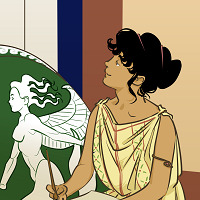
So I've been meaning to also offer a big thanks to suspense novelist Matthew Keville (@matthewkeville) for his excellent feedback and support over the years that I've worked on The First Empress, and more recently for agreeing to write the foreword for the novel. Matt first discovered my novel through excerpts I posted to my old blog and took interest in the story, world, and characters, reading several of my drafts and giving great feedback and advice. When I learned that I'm not supposed to be the one who writes the novel's foreword, Matt was cool enough to agree to write it for me. I've posted Matt's foreword below the cut. Huge thanks to Matthew once again and to my Tumblr readers for their support!
********************
It’s no secret that the modern fantasy genre stands on the shoulders of Tolkien. There are the Children of Tolkien in their thousands, with their elves and dwarves and orcs, their magic swords and castles and general Northwestern-Europe-in-the-Middle-Ages milieu, writing novels and movies and tabletop roleplaying games. And then there are those whose work is a reaction to Tolkien, most famously George R.R. Martin with his deconstruction of Tolkien’s morally-aligned universe. This is all well and good; we all stand on the shoulders of giants—Tolkien himself stood on the shoulders of Beowulf and The Kalevala—and no one would do it if people didn’t love it. But it does sometimes seem that people aren’t making the fullest use of the literally infinite possibilities of the fantasy genre.
Jack Newbill takes his inspiration from somewhere else. He goes all the way back to the ancient city-states of the Mediterranean, where the warriors wear linen and bronze instead of steel, and the mysterious marauders from the edge of the world are the red-haired barbarians with the bizarre custom of wearing pants. It’s something I’ve never seen in my forty years of reading fantasy.
Newbill’s Vestic Sea may seem familiar at first, but it quickly becomes clear that it’s at least as foreign to our modern world and values as Wonderland. It is a place where slavery is a simple fact of life, where a wooden warship with an extra rowing-deck is the cutting edge of military technology, where the gods may or may not be real (but if they’re not real, where does all this very real magic come from?), and where our world’s ideas of gender and sexuality just don’t apply.
It’s also an Iron-Age viper’s nest of violence and intrigue, and to survive it—let alone triumph—will require a different kind of hero.
(Granted, Tolkien’s heroes were also a different kind of hero than the standard fantasy hero, in the sense that they were Everyman Heroes who stayed Everyman Heroes instead of revealing some hidden talent or bloodline. But Newbill’s hero is precisely the opposite.)
Queen Viarraluca is a hero in the classical sense—which is to say, the Ancient Greek sense. She is an extraordinary human being who accomplishes truly great and glorious things against astounding odds… but those things aren’t always things that we of the 21st Century would consider “good”. If she were anything less, she wouldn’t survive the first chapter. No time for rookie heroes to learn the ropes on the Vestic.
Viarra is a political savant, a superlative warrior, a military genius, and a visionary as to what the fractured and bickering city-states of the Vestic could become. She is iron-willed enough to do terrible things for the greater good, and kind-hearted enough to weep in her girlfriend’s arms after. And as many characters comment, she is friggin’ huge.
She also likes porn (in the form of racy sculpture and erotic poetry), kittens (even though her girlfriend’s allergic), and as much as she loves her chief handmaiden/concubine, she enjoys collecting a harem as much as any other horny teenager might.
And she’s hearing voices. Voices that point toward a glorious destiny. And even Viarra’s not sure if she’s hearing the voices of the gods or if she’s going mad.
As magnificent as she is, Queen Viarraluca is a beautifully human character who is simultaneously as alien as any elf and as familiar as the captain of the high school girls’ basketball team. I envy you as you read her story for the first time.
Welcome to her world.
—Matthew Keville, author of Hometown
12 notes
·
View notes
Text
I didn't know Viarra, my warrior-queen protagonist, was gay when I first started The First Empress. Similarly, her right-hand-man Bevren wasn't trans until pretty late in the process. Viarra's mother wasn't giant and Celtic-looking until I felt like I needed a genetic reason for Vi to be over six-feet-tall with hair like polished copper.
I saw an interview where George RR Martin explained a type of writer he referred to as 'gardeners.' These are writers who start with an idea and plant it like a seed and let it grow and evolve during the writing process. I rather liked the metaphor.
Posting this for the people who think that Tolkien's world-building was something complete and entire and finished before he started to write.
You always learn and discover your story and your world as you write. Sometimes you are just the first reader.
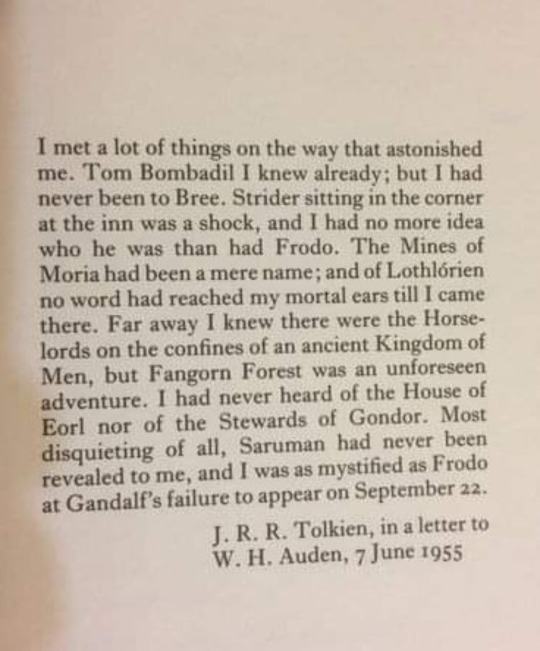
20K notes
·
View notes
Text

Maps! Also important to my setting and world-building are the two maps I commissioned from my artist friend Telenia Albuquerque (@9musesandanoldmind)! The upper map is of most of the Vestic Sea where the story takes place. The three primary powerhouse states are the Empire of Pellastor, the Illaran Confederation, and the Hegemony of Andivel, in that order. Alliances on the Vestic Sea are incredibly fluid, and thus many of the unaffiliated city-states from year to year may vary from enemies to neutral to trading partners to temporary allies with each other or with the other major powers.

The second map is a more detailed look at the Hegemony of Andivel, with an inset of Queen Viarraluca's tiny island of Kel Fimmaril. Something of a distant third, power-wise, Andivel started with potential to have rivaled or even surpassed the other two powers by Viarra's time. Between an inefficient tetrarchy and bloated council, however, Andivel's recent history has been a sad series of missteps and squandered opportunities. The most recent missteps include borrowing a huge amount of money to finance a pair of stalemate campaigns against the pants-wearing barbarians from the Vedrian Highlands to the north. With little to show for their efforts, Andivel has spent the last five years under crippling debts that have severely affected both their economy and military.
10 notes
·
View notes
Text
Campfire
The following excerpt from The First Empress: Book I is from one of my therapist's favorite scenes. He particularly liked the description of Lochagos Vola in the campfire light. Vola is Queen Viarra's Lochagos Hippeis (Master of Horse) in the hegemonic army. Nora is a young farm girl who volunteers for the army as a peltast (javelin skirmisher) in the wake of the deaths of her father, brothers, and fiance at the hands of barbarian raiders.
************
“[Queen Viarra] sounds too good to be true,” Nora admitted, cutting another hunk of mutton.
“Maybe I can introduce you some time,” Vola offered. “You’re cute enough, who knows, maybe she’ll make you part of her harem.”
“She has—” Nora paused to swallow a bite, “she has a harem?”
Vola cackled at her surprise. “Not that I know of, but she only takes women as bedfellows, so I’d be surprised if she doesn’t end up with a following of willing women to screw senseless every night. From what I’ve heard, she’s pretty spectacular at it.”
“So you’re not one of those women?” Nora asked, kind of aroused at the thought of bumping cunnies with a giant warrior queen.
“Nah, Viarra’s practically a daughter to me,” Vola laughed again. “She even came to me for advice the first time she and her handmaid Elissa decided to fuck. It must’ve worked out, since Elissa’s the royal concubine now.”
“I know I’ve been attracted to women in the past, but I’ve never actually been with one,” Nora admitted before finishing the last couple bites of dinner.
“I can show ya what it’s like if ya want, sweet-tits,” Vola offered, setting her knife and plate aside as she finished eating.
Nora raised her brows at the proposition, looking over at Vola. The firelight danced off Vola’s tattoos, wiry muscles, and weathered brown skin, somehow making her look perversely alluring against the surrounding darkness. Leathery, mostly grey-haired, and easily old enough to be Nora’s grandmother, the lochagos wasn’t a beautiful woman—or really even a handsome one. But Nora had to admit there was an animalistic charisma about her. Something told Nora that despite Vola’s fearsomeness and savagery, she had a deep understanding of sexuality and intimacy.
“I’ll… think about it,” Nora murmured, chewing her lower lip.
12 notes
·
View notes